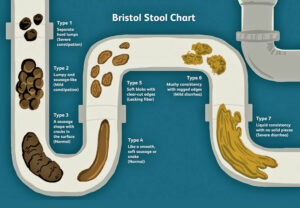Dear friends, I have a question for you – Do you have a healthy gut? If your answer is, “I guess,” or “I don’t know,” or “I’m not sure,” you’re not alone!
It’s challenging to know what’s ‘normal’ for everyone or if there’s an issue that needs to be discussed or shared. The good news is that there’s a factor which can provide ample information about your gut health – your stools (faeces). It’s an excellent indicator – right from shape, consistency and frequency of bowel movements – it provides important clues about the ongoings inside your stomach or microbiome.

What Your Stools Say About Your Health…
FREQUENCY: How often you pass stools depends on your diet (what you eat, how much you eat and how often you eat). Ideally, pooping 2 – 3 times a day is perfect for optimal elimination of hormones, toxins and chemicals that find their way into your food and water (which is inevitable).
CONSISTENCY: The ideal poop is soft and long enough to form a curled-up ‘snake-like’ shape, when passed. The ‘Bristol Stool Scale’ makes it easier for you to understand by breaking your bowel movements into seven types, as under:
Type 1: Little hard pellets indicate severe constipation and should not ever happen.
Type 2: Super hard, lumpy log shape is another sign of constipation, but a mild case compared to Type 1
Type 3: A log-shaped poop with a few cracks, that is quick and easy to push out, is considered normal.
Type 4: This is where the ‘snake-shaped’ stool, the gold standard of healthy poop.
Type 5: Passing soft, separate blobs of poop indicates moving into diarrhoea.
Type 6: When your stools are super soft but still intact.
Type 7: No solid pieces, passage is watery and extremely quick – this is full-blown diarrhoea.
COLOUR: Ideally, stools should be a standard brown colour. This is what the following different colours likely indicate:
Black: Stools usually turn black when you’re consuming certain supplements / medications. Even so, it’s best to check with your doctor, if it doesn’t revert to normal.
Green: This happens mostly if you’ve eaten something that was in that colour family.
White/Cream: This could be connected to your diet, indicating the presence of too much fat in your diet, or that you aren’t absorbing enough nutrients, or in extreme cases, a blocked bile duct.
Red: If you ever experience blood in your stools, you should speak with your doctor right away, as it can be a sign of haemorrhoids or intestinal bleeding.
If you have a healthy gut, you should be able to pass your stools and be out of the loo withing a few minutes. Anything longer than that, or any straining or long waits, might be a sign of underlying gut dysfunction.
Congratulations to those who have identified with Type 3 and 4 category – you have a healthy gut! For the rest, here are a few tips on how to better your gut-health:
Identify Any Food Sensitivities: There is no one diet which is right for everyone. While there are some foods that might irritate a lot of people, (like gluten and dairy), there are many other foods that have to be approached on a person-to-person basis. The good news is that an elimination diet, which I also call a ‘gut reset’, can help you identify any underlying food sensitivities, which leads to having healthier bowel movements. It’s better to discuss this with a healthcare practitioner.
Add More Fibre To Your Diet: More specifically, insoluble fibre, which doesn’t dissolve in water and is important for healthy poop excretion because it helps the movement of material get past our digestive system. It also keeps it softer, making it easier to pass, thus getting you closer to Type 3 or 4 poop consistency. In fact, insoluble fibre is important even if you struggle with diarrhoea because it adds bulk and weight to your faeces, so it’s not so watery.
Get A Stool Test Done After Discussing This With Your Doctor: If you really want to know what’s going on with your gut health, ask your doctor about a comprehensive stool test, which involves collecting samples from the toilet over multiple days. This can reveal fungal, bacterial or parasitic overgrowth as well as beneficial bacteria levels, giving you a complete look at the microbiome.
Add Magnesium To Your Diet: If you are struggling with constipation, a magnesium supplement is a great natural mineral to lean on. Certain forms of magnesium, like magnesium oxide and citrate, can help pull water into the intestines, which helps you pass stool more often and with greater ease.
Add More Resistant Starch To Your Current Routine: R.S. i.e Resistant Starch provides the benefits of both, soluble and insoluble fibre to your diet. Resistant starch, also known as prebiotic fibre, doesn’t get digested in your stomach and ends up in your intestines, where it provides food for your beneficial gut bacteria. Some sources of resistant starch include green bananas and plantains, cooked and cooled potatoes and potato starch.
Talking about stools can be uncomfortable at first but there’s so much to learn to your benefit, by paying attention to colour, shape and frequency, which helps you guide yourself towards healthy lifestyle choices. Your gut health will thank you!
- Power Of Colostrum: Tackle Inflammation, Nourish Your Gut! - 23 March2024
- Unlocking The Secret To Strong Bones: A Blueprint For Lifelong Bone Health - 16 March2024
- Secret Superfood: Beetroot Powder To Your Rescue! - 2 March2024
